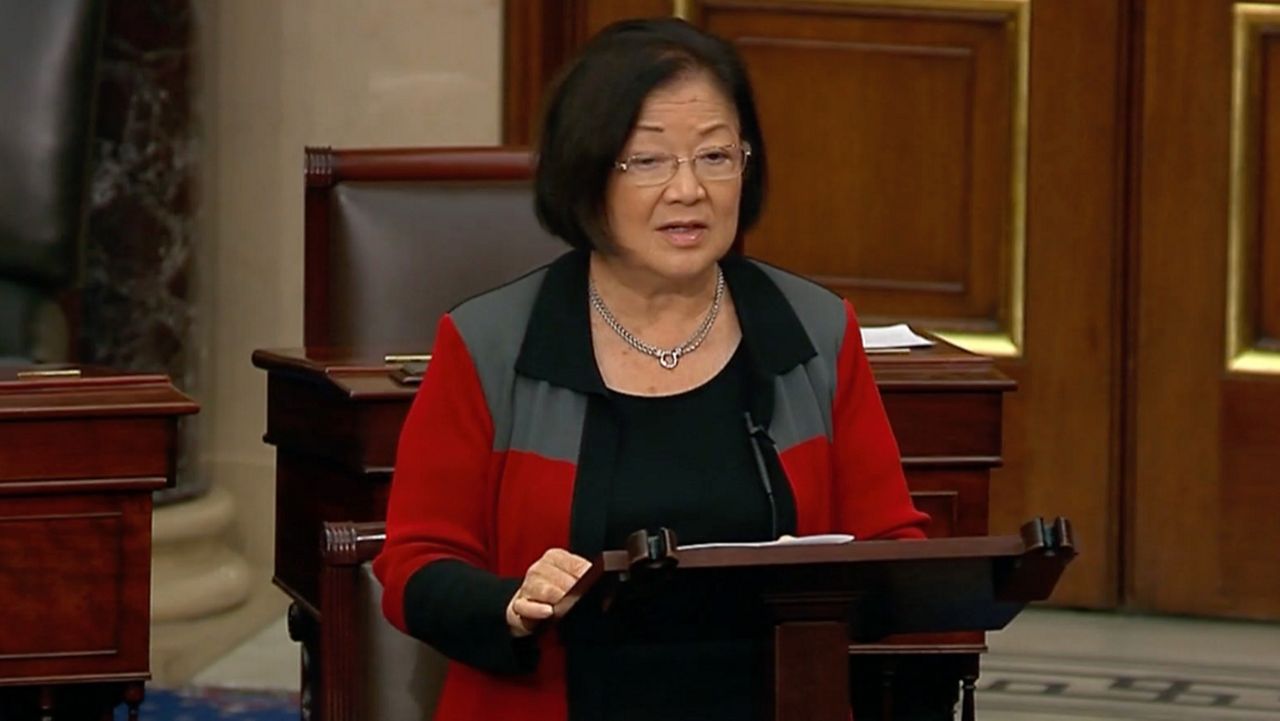U.S. Sens Mazie Hirono, D-Hawaii, and Tammy Duckworth, D-Ill., introduced a multi-pronged bill on Wednesday aimed at keeping families together through the immigration process.
“As the only immigrant currently serving in the U.S. Senate, I am proud to introduce the Reuniting Families Act to update our country’s family immigration system and promote family unity,” Hirono said. “By implementing changes to reduce the backlog of family-based immigration visas, exempting close relatives from visa caps, and preventing the separation of LGBTQ+ families, this bill will better prioritize family unity in our immigration system. We desperately need comprehensive immigration reform, but in the meantime, the Reuniting Families Act is a step in the right direction to help reunite or keep families together as they navigate our immigration system.”
The lawmakers said the new legislation would promote family unity in the U.S. immigration system, reduce family-based immigration backlogs and update laws to better reflect how families immigrate to the United States.
“Our country’s broken immigration system is riddled with unnecessary barriers that have created backlogs and kept families apart for years,” Duckworth said. “This legislation would implement commonsense reforms to help end family-based backlogs, which keep too many with approved green card applications stuck in bureaucratic limbo and get more families where they belong — together.”
The bill includes Hirono’s previously proposed Filipino Veterans Family Reunification Act, which would speed up the visa process for children of Filipino World War II veterans.
The Reuniting Families Act proposes to:
-
Increase the number of visas United States Citizenship and Immigration Services may distribute by “recapturing” unused visas from previous years and adding them to the available total
-
Exempt close relatives from visa caps, extending the current exemption to spouses, unmarried children under 21, and certain parents of legal permanent residents
-
Raise the per-country family-based immigration caps, thereby allowing more visas to go to a countries such as India, China, Mexico, and the Philippines
-
Provide discretion to the government when applying certain bars on individuals, eliminating unfair requirements for individuals to go to their home countries if that individual unlawfully entered the United States
-
Extending protections against “aging out” after age 21 for step-children and children of visa holders
-
Expand cancellation of deportation orders to make it easier for noncitizens to apply in cases of extreme hardship to a family member who is a U.S. citizen or legal permanent resident
-
Eliminate discrimination against LGBTQ+ families, including resettling partners together with their refugee spouses and allowing spouses to come to the U.S. if their partner is granted asylum
Companion legislation was introduced in the last year by Representative Judy Chu, D-Calif., who serves as chair of the Congressional Asian Pacific American Caucus.
The legislation was endorsed by several immigrant advocacy groups, including Asian Americans Advancing Justice, the Immigrant Legal Resource Center and the Coalition for Humane Immigrant Rights.
“Like many immigrants, millions of Asian Americans started their American story because of family, and often through the family-based immigration system,” Asian Americans Advancing Justice said in a statement released on Wednesday. “The last significant legislative change to the family-based immigration system happened in 1990. Yet over 30 years, the system that shapes our country and future has broken down, failing to live up to our values and hopes. The Reuniting Families Act is a vision for a better immigration system — one that recognizes that families belong together.”
Elizabeth Taufa, senior policy attorney and strategist for ILRC, said the bill helps to remedy an outdated immigration system that has kept some immigrant families separated for decades.
“The Reuniting Families Act will go a long way toward eliminating the unnecessary bureaucracy and delays and will bring relief for families who have been stuck in administrative purgatory for far too long,” she said.
Michael Tsai covers local and state politics for Spectrum News Hawaii. He can be reached at michael.tsai@charter.com.


